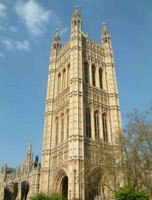REVIEW
JUST THE JOB
- TOPIC WORLD
Babysitting: niñera
car washing: lavado de coches
delivering newspapers/ advertising leaflets: la entrega de periódicos / folletos de publicidad
dog walking: pasear al perro
gardening: la jardinería
giving private lessons: dando clases particulares
helping at an animal centre: ayudando a un centro de animales
working in a bar/hotel/shop/supermarket: trabajar en un bar / hotel / tienda / supermercado
working as a lifeguard: trabajando como salvavidas
ANIMAL EMOTIONS
|
 The House of Lords is a component of the Parliament of the United Kingdom, which also includes the Sovereign and the House of Commons. The House of Lords is an unelected body, consisting of 26 senior clerics of the Church of England (the "Lords Spiritual"), as well as 669 members of the Peerage (the "Lords Temporal"). Lords Spiritual serve as long as they continue to occupy their ecclesiastical positions, but Lords Temporal serve for life. Members of the House of Lords are known as "Lords of Parliament".
The House of Lords is a component of the Parliament of the United Kingdom, which also includes the Sovereign and the House of Commons. The House of Lords is an unelected body, consisting of 26 senior clerics of the Church of England (the "Lords Spiritual"), as well as 669 members of the Peerage (the "Lords Temporal"). Lords Spiritual serve as long as they continue to occupy their ecclesiastical positions, but Lords Temporal serve for life. Members of the House of Lords are known as "Lords of Parliament".The House of Lords originated in the 14th century and has been in almost continuous existence since. It was abolished in 1649 by the revolutionary government that came to power during the English Civil War, but was restored in 1660.
The House of Lords (the "Upper House") was once more powerful than the elected House of Commons (the "Lower House"). Since the 19th century, however, the powers of the House of Lords have been steadily declining; now, the Upper House is far weaker than its parliamentary counterpart.
Under the Parliament Act 1911, most legislation passed by the House of Commons can be delayed, but cannot be rejected, by the House of Lords. Reforms were enacted under the House of Lords Act 1999, which removed the automatic hereditary right of many peers to sit in the Upper House. Additional reforms are contemplated by the current Labour Government, but have not been passed into law.
In addition to performing legislative functions, the House of Lords also holds judicial powers: it constitutes the highest court of appeal for most cases in the United Kingdom. The judicial functions of the House of Lords are not performed by the whole Chamber, but rather by a group of members with legal experience, who are known as "Law Lords". The House of Lords is not the only court of last resort in the United Kingdom; in some cases, that role is fulfilled by the Privy Council.
The full, formal style of the House of Lords is: The Right Honourable The Lords Spiritual and Temporal of the United Kingdom of Great Britain and Northern Ireland in Parliament Assembled. The House of Lords, like the House of Commons, meets in the Palace of Westminster.
1. The members of the House of Lords are elected by the people.
True.
False.
We don't know.
True.
False.
We don't know.
2. Members of the House of Lords are known as "Lords of Parliament".
True.
False.
We don't know.
True.
False.
We don't know.
3. The House of Lords has more power than the House of Commons nowadays.
True.
False.
We don't know.
True.
False.
We don't know.
4. The House of Lords can reject legislation passed by the House of Commons.
True.
False.
We don't know.
True.
False.
We don't know.
5. The House of Lords has also judicial powers.
True.
False.
We don't know.
True.
False.
We don't know.
6. The House of Lords meets in the Palace of Westminster.
True.
False.
We don't know.
True.
False.
We don't know.
Score:

0 comentarios:
Publicar un comentario
Suscribirse a Enviar comentarios [Atom]
<< Inicio